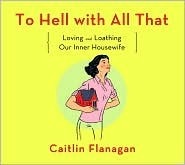What do you think?
Rate this book


360 pages, Audio CD
First published January 1, 2006
Writing honestly about these issues in the national press has been difficult, because it required challenging certain articles of faith that comprise what the current American feminist agenda requires us to believe about womanhood. Among them: girls do not have a natural interest in home making; a young woman should not spend any of her energies finding a suitable husband and preparing for her life as a wife and mother; a woman doesn’t need a man, and a child doesn’t need a father; caring for the emotional and physical needs of a husband constitute subservience; paid professional work outside the home is the most valuable way for a woman to assert her intelligence and native gifts onto the world; there is no connection between the number of hours a woman spends with her child and the nature of her relationship with that child. For many women, this code has brought heartache. Why? Because it refuses to acknowledge a truth as old as civilization – that a woman’s ambition to be a wife and mother can be just as powerful as her ambition to become a respected member of the labor force.
The Jill Bialoskys of the world may feel that they belong to the most outrageously group of women yet to stride the earth. These women assume that, in the very act of confession [about their loss of sexual interest in their partners] they are wearing the mantle of freedom. They are not only free enough to perform oral sex in a moving car (a bit of cutting edge eroticism that I believe dates back to the Model T), but also free enough to admit, in tones of outrage and bewilderment, to the abrupt waning of their desire. What they don’t understand, and what women of an earlier era might have been able to tell them, is that when the [woman’s sexual interest] turns off, it is time not to rat out your husband (is there anything more wounding to a man, and therefore more cruel and vicious than a wife’s public admission that he’s not satisfying her in bed?) but to turn it back on. It is not complicated. It requires putting the children to bed at a decent hour, and adopting a good attitude. The rare and enviable woman is not the one liberated enough to tell hurtful secrets about her marriage to her girlfriends or the reading public. Nor is she the one capable of attracting the sexual attentions of a variety of worthy suitors. The rare woman, the good wife and the happy one, is the one who maintains her husband’s sexual interest, and who returns it in full measure.
Friends, all of whom were doing exactly as I was doing, rushed to assuage my guilt. Who knew if social security would even be around by the time Paloma retired? It was better, they said, to put a little money aside each month in a money market account and tell her not to touch it until she was 65. I supposed that was true, although none of my friends was doing such a laudable thing. And besides, we were all liberals, weren’t we supposed to be violently opposed to privatizing social security? My old ace in the hole, the notion that Paloma was an independent contractor turned out to be bogus. The Federal tax code makes it explicitly clear that domestic workers are not, under any circumstances, independent contracts. They are always employees. The reason for this bit of precision shamed me further. When the program was designed under FDR, domestic workers (the vast majority of whom were black women) were specifically denied access to the benefits. In those days, women’s work was hardly seen as work at all, and the work of black women even less so.